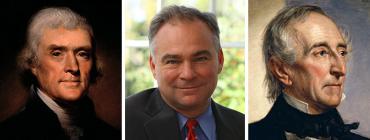
While Virginia has produced more than its share of presidents, the Old Dominion isn’t exactly known for its vice presidents. Of course now that he’s Hillary Clinton’s running mate, Tim Kaine is hoping to change that.
Thomas Jefferson was the first of two vice presidents from Virginia. Jefferson took second behind John Adams in the 1796 presidential election and ended up as the understudy to his Federalist rival since the election took place before the Twelfth Amendment was added to the Constitution,.
Jefferson continued his political rivalry with Adams during his four years as vice president. When Adams pushed the Alien and Sedition Acts as tensions heightened with France, Jefferson and his allies, namely James Madison, countered with the Kentucky and Virginia Resolutions which maintained states could declare acts of Congress unconstitutional. Jefferson beat Adams in the rematch in 1800 even as his running mate Aaron Burr pulled in as many electoral votes, leading to a protracted contest in the House of Representatives.
The only other vice president from Virginia served only a month. Looking to trip up Martin Van Buren in the 1836 election, the fledgling Whig party ran three candidates. William Henry Harrison outpaced the other two Whig presidential candidates while John Tyler, a conservative Virginian who served as governor and in both chambers of Congress, won some support for vice president though more Whigs backed New York Congressman Francis Granger.
After the nation suffered through the Panic of 1837 under Van Buren’s watch, the Whigs ran Harrison in 1840 with Tyler as his running mate in a colorful campaign playing up Harrison’s military record and routed the Democrats. But Harrison’s triumph was short lived. A month after taking office, Harrison died and Tyler ascended to the presidency. Tyler’s strict constructionist views of the Constitution and his defense of states rights led him to clash with Henry Clay and the Whigs in Congress. Eventually, the Whigs drove Tyler out of the party and his efforts to win a term in his own right went nowhere. After trying to lead efforts to peacefully resolve the section crisis after Abraham Lincoln’s election, Tyler was elected to the Confederate House of Representatives but his service there was short as he died in early 1862.
Since then, there haven’t been any other vice presidents from Virginia. Politicians from the Old Dominion generally haven’t been close to being on national tickets but, in recent decades, there had been some vice presidential buzz for both Warner, Chuck Robb and Kaine back in 2008.
Still, the nation came close to having two Virginians duke it out for the vice presidency. Van Buren had been pushing William C. Rives to be his vice president in 1836 but he lost out to Richard M. Johnson. Rives, who was moving away from the Democrats and over to the Whigs, and Tyler would tangle in a long running Senate contest which only ended when Tyler was offered the vice presidency. Rives would later be something of an ally to Tyler during his presidency and would later serve with his old rival in trying to find common ground during the sectional crisis and in the Confederate Congress.
Of course both of Virginia’s vice presidents ended up in the White House. If Clinton wins in November, Kaine, only 58, could be looking to make it a trifecta.


